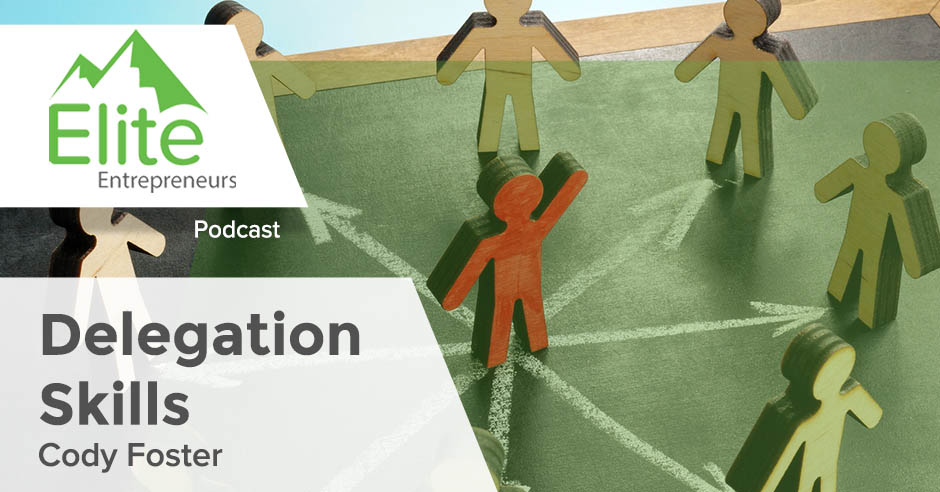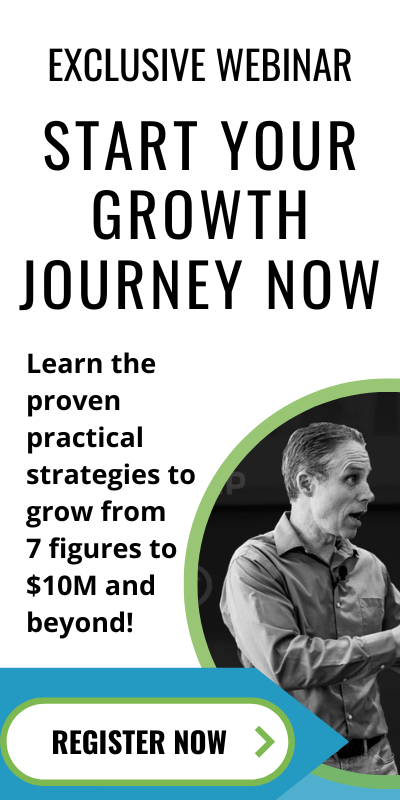Episode 87: Delegation Skills, With Cody Foster
What You Will Learn:
- How Cody’s career led him to become a financial advisor and co-founding a business, and what early challenges he faced, and lessons he learned as an entrepreneur
- How Cody and his teamwork to help small business owners who “happen to be financial advisors”
- Why the biggest challenge Cody faced as an entrepreneur was learning to let go of responsibility and develop his delegation skills
- How the process of learning to delegate worked for Cody, and why it’s crucial to make sure that the person you’re delegating to is able to do the job the way you want it done
- Why delegating responsibility also means offering accountability, and why Cody had to learn to clearly define expectations
- How Cody learned to work in the business less and to work on the business through strategic planning and looking to the future
- Why Cody attributes the growth and success of Advisors Excel to hiring great people and investing in their growth
- How the leader that manages all of Advisors Excel’s digital marketing efforts started with the company as an intern, and why promoting from within has proven a winning strategy
- Why overhiring for a position is an unexpected pitfall, and why it’s crucial that your new hires fit with your company’s Culture
- Why it’s usually obvious within a short time if someone isn’t a great Culture fit for your organization, and why you need to address it quickly
About Cody Foster
Cody Foster is one of the co-founders of Advisors Excel. In 2004, after leaving a corporate job to partner with David Callanan to be independent financial advisors, he realized the support system for independent advisors was dramatically insufficient. So, in 2005, along with third partner Derek Thompson, they formed Advisors Excel with a goal of building a world-class support structure for independent financial advisors across the country.
Today they have over 650 employees and are responsible for generating over $7 billion in annual sales. Their success in achieving this has led to their story being featured in Success Magazine, Darren Hardy’s book “The Entrepreneur Roller Coaster” and Tony Robbins’ #1 New York Times bestselling book, “Money, Master the Game.”
Cody graduated from Washburn University in 1999 and has made Topeka his home ever since. He is a big believer in the future of the capital city of Kansas – having served as the Chairman of the Greater Topeka Partnership and a leading investor and developer in quality of life initiatives including The Cyrus Hotel, The Pennant, and Iron Rail Brewing.
As much as he enjoys business, his real love is family. Cody, and his wife Jennifer, a Topeka native and fellow Washburn graduate, have been married since 2001 and have two children, Dylan and Ella.
Resources:
- Website: advisorsexcel.com
- LinkedIn: linkedin.com/in/cody-foster-9013637
- LinkedIn: linkedin.com/company/advisors-excel/
- Facebook: facebook.com/advisorsexcel/
- Twitter: @AdvisorsExcel1
Additional Resources:
- Elite Business Health Assessment: https://growwithelite.com/health
- Email: info@GrowWithElite.com
- Website: https://growwithelite.com/
—
Listen to the podcast here
I’m excited because I have a guest who not only has been on the seven-figure journey but has been well into the eight-figure Journey. We didn’t talk about it as revenue, but I know from these 600-plus employees that they are doing something big over at Advisors Excel. Cody Foster is one of the cofounders of Advisors Excel, and I firmly believe they know how to help advisors excel. We’ll have Cody share a little bit more about his business. Welcome to the show, Cody. Thanks for being here.
I’m happy to be here. I am looking forward to the conversation.
Tell everyone a little bit about Advisors Excel, so that they have some context for our conversation.
I’ll do the quick story. My first job out of college was in a business very similar to this. After about four years, Dave, who’s my partner here, we decided we were going to leave and go be financial advisors. We were working with financial advisors but always thought that seemed like a cool job. It seemed like they made good money, helped people, and had this quality of life that seemed envious to us at the time. We left to go be financial advisors. This was back in January 2004.
We found out quickly it wasn’t going to be as easy as we thought it was going to be. The place I worked at beforehand had 200 employees or so. There was always someone to do something for you, whereas now, it was only Dave and I. We were responsible for everything. The conversation we were having before we started was that mentality that I’m not a financial advisor. All of a sudden, I’m a small business owner. I’ve got to figure out all these different aspects of running the business successfully.
That first year was a little bit more of a struggle than we anticipated it to be. We had this idea that if we could find 25 or 50 other good advisors and learn from them, how much better would our business become? We knew this advisory side of the business where we supported the financial advisor with the products and stuff. With Advisors Excel, we started in February of 2005 with the idea of building this side boutique business into our actual financial advisor practice. It took off, and so many advisors that we started talking to were feeling some of the same challenges and frustrations we are.
It’s like, “How do you continue to grow and scale the business?” Many of them get into the business because they’re good at sales or they’re good at financial advising or something like that, but a lot of them don’t have that experience on how to grow and scale the business. Since then, it’s taken off. We work with about 700 independent financial advisors across the country now. We are supporting people transitioning into retirement. We do a lot of annuities and life insurance. We have a whole investment management division also. We’ve got about 650 employees now that support those 700 firms that we work with.
That’s a long way from what happened back in February of 2005 when you and Dave said, “Let’s go do this thing.” For some people who are reading this, you caused them to go back to that moment when it was me, myself, and I, or a couple of us. You had to do everything, and while we honor the journey from startup to $1 million in revenue, our focus is after they hit that first million.
They’ve got a steady operation going. It’s working. They built something that now they’re running in. They’ve built their own treadmill or hamster wheel and they have a hard time getting out of that. You help financial advisors do some of the company-building work that we help lots of businesses do. Let’s talk about your own journey through that. You also bring a perspective of seeing lots of other people making these same transitions.
The advisors we work with, our minimum is we say, “You need to be doing at least $1 million a year in revenue.” We’re not the firm that teaches someone how to be a financial advisor. We always say, “We want to help good advisors become great business owners.” The final line is we say, “So they can help people have an amazing retirement,” because the better you are as a business owner, the better you’ll be as an advisor. We have our own perspective of going through all those steps but also spend a lot of time helping small business owners who happen to be financial advisors. They do the same thing.
The better you are as a business owner, the better you'll be as an advisor. Share on XThat’s an important transition. I’m glad that you said that, Cody, because a lot of people reading are having a hard time. A previous guest talked about it as divorcing from their previous identity. Whether it’s financial advising, painting, or whatever thing that you know and do, how do you divorce yourself from that old person who knows something well and becomes a business builder or a business owner who’s trying to grow?
If you take a walk down memory lane with us, you go to that point where you and Dave had to separate from being great at what you guys did or the technical aspects of your work to now being business builders. What were some of the early challenges for you guys as you are trying to make that transition?
That transition for us happened 3 or 4 years in. In ’04 when we were the advisors, it never happened. In ’05, we started this but we’re still trying to be financial advisors. We had a couple of staff by the end of the year, but then things started growing pretty quickly. As I look back on our own personal journey, there are a few challenges there. We had a third partner. His name was Derek. We bought him out a couple of years ago, but for ten years of this journey, the three of us did everything.
Early on, I would say one of the biggest challenges was when we started, the three of us would always come together to make every decision. As the company grew and scaled, we kept that decision-making process in place. In 2009 or maybe 2010, 3, 4, or 5 years, the 3 of us as the founders and owners of the business but also working in the business every day had started to bottleneck with things happening in the organization.
Everyone waited for the three of us to get together, talk about these things, and make a decision. That was one of the first ones. One of the first things that we did was divide up our responsibilities a little. We each had some very different unique gifts. We focused on those areas and started trusting each other to make a decision there versus the three of us.
It’s that next big shift, and this is the challenging one that every entrepreneur I’ve ever met or worked with that’s going through these growth components goes through is when you start delegating those decisions out to other people as the business grows and scales. We were joking a little bit about Infusionsoft before we even started. I’m like, “I think we do, but I’m not sure because I haven’t been involved in something like that for a while.”
Everyone knows as the business grows, you’re going to have to hire great people and you’re going to have to delegate and trust them with stuff. Knowing that and doing that are two very different things. As I look back, the biggest challenge that we had ever in growing and going to business is starting to let go and let other people run with things and make the decisions. Especially when you start the business, it’s your baby. You’re so used to knowing everything that’s going on. You have to get comfortable with not knowing everything about everything that’s going on in the business. That would be probably the biggest one. The other is hiring great people.

Delegation Skills: As the business grows, you’re going to have to hire great people and delegate and trust them. That’s probably one of the biggest challenges that you’ll ever have.
When we first started hiring, especially as the business was growing and scaling, money was always tight. You were always making hiring decisions based on the financial situation, not so much on who was the absolute best candidate. I say all the time that if I could go back and do things over, it’s prioritizing hiring great people. I had a friend say this one time. He’s like, “A-plus or rock star employees aren’t worth 20% more. They were three times more than an average employee.” That would be the other big one as I think back.
There’s a story from Kip Tindell from The Container Store. They have these principles of growth, and 1 equals 3 was one of theirs. The one rock star team member equals three average. It reminded me of his book that’s called Uncontainable. If you haven’t read it or anybody reading it, you should check it out. It’s amazing. It’s good stuff.
You said several things in there that are super valuable. Let’s go back and dive into a couple of them here for the benefit of those reading. You said it’s easier to delegate stuff and organize the work in a way that you can give responsibility to somebody else. It’s easy to say that but harder to do. Let’s dive into that more because all of us have to wrestle with this one. It’s one thing to say, “I’m giving you this responsibility.” It’s another to let go of it and let somebody take it. What is key to that being successful? How do you do it? That’s just a mindset thing. That’s part of it.
It’s a lot of trial and error candidly. I heard Michael Hyatt say this one time that there are levels of delegation, and he said it well. This is something that I shared with you. When we have people that step into new leadership roles here, it’s one of the biggest challenges that they go through too. He said, “The first step is you tell the person exactly what you want them to do and then you follow up to make sure they did it exactly the way you want to do it.”
If you are starting new, you almost have to do that because I’ve also seen the opposite side of this. I’ve seen it a lot with some of our advisors where they’re so anxious to offload something that they don’t like doing anymore onto somebody else. They may bring in a new person, give them everything, and not stay on top of it to make sure. I’ve seen that backfire sometimes too. You need to make sure that the person you’re going to delegate to is going to be able to do the things that you’re asking them to do.
Sometimes, I don’t think that’s talked about enough. Not everyone you put in a position and delegate stuff to is going to do a great job with it. If you get burnt once or twice on that, it’s going to scar you a little and you’re not going to want to delegate other stuff. It is thinking through what you’re going to delegate to them, being very clear on the directions that you give them, and following up to make sure that they get it done.
That second phase that Michael always talked about is you give them some direction but you’re not telling them exactly what to do. You’re starting to trust them to figure out a few more of the pieces, but you’re also having them come back and tell you like, “Where are we at? How did we do? Did we get it done?” The third phase is you’re not giving them any direction at all. You’re saying, “We need to do this. You go figure it out and you report back to me on what you figured out or what we did.” The final phase is they don’t even report back. You build such a relationship with them that you know you trust them to go get the job done. If you can work through some of those phases and people earn your trust and you see that they’re competent and they can do the job, you’ll get more and more comfortable with delegating stuff to them.
I would say the other thing that I still do to this day is do a weekly one-on-one with all of the direct reports that they report to me. A lot of times, we’re talking about strategic things within their department. Our chief marketing officer reports to me. We had a meeting right before we hopped on together. It’s some strategic conversation, but he’ll keep me up-to-date, “Here’s a few of the things that we’re working on.” If he wants to bounce something off of me, it’s a great opportunity to do that also. Staying plugged in is another important aspect of it.
I love everything that you shared. I want to try to pull out some lessons out of there for people. One of them is this, and you didn’t put it in these words. You would agree with me that it’s very challenging to delegate ambiguity. You have to get clear to yourself about what you’re handing to somebody. I love all the conversations you said. Situationally, some people are ready to own something without a lot of guidance.
Other people aren’t. They might be new to the role or new to your company. You might need to give a little more guidance, but there are clear expectations and measurable activities or results. It’s something that says, “Here’s what you own, and I’m giving you that ownership with accountability.” I love the weekly one-on-one practice because now, it’s not a surprise.
Every week, you guys are talking about how well that ownership is going. They have it, and with some of them, you’re having to give direction because they’re new to it. With others, maybe they’re coming to you for thoughts and ideas because you’re giving them parameters but lots of freedom and flexibility within that. Also, they’re looking for some thoughts.
You make a great point. Before I was delegating stuff and I was doing this stuff, I didn’t have to stop, think, write out, and clarify exactly what I was trying to do because I knew what I was trying to do. Early on, even in our career or our kind of stages of growth, I expected the people I was talking to and delegating that they knew all the things that were going on in my mind. I wasn’t very good at being clear on what the expectations were. A big part of it that you hit on is we’re so used to doing it. We don’t have to think about if I were going to try and explain this to someone else to do what I do because you have that conversation going on in your head already. It’s a good point.
You have all this rich context history. You figured it out a piece at a time. You don’t fully appreciate what you know having done it. A lot of business owners know they should, but they hate the idea of documenting processes, doing standard operating procedures, or whatever technical corporate-y type of term. They spurn at that and go, “I don’t want any part of that,” but until you figure out how to document or how to at least define and measure ownership that you’re delegating to somebody, it’s hard to expect that they’re going to deliver for you.
You guys learned that lesson. You gave us a flavor of the one-on-ones. I love that you guys do that. I’m a strong advocate for that as well, but what would you say to a business owner who’s saying, “I see these people every day. We talk every day. Why would I need to have allocated or dedicated time to meeting one-on-one with each of my direct reports?” What would you say to that?
It’s to stay on top of things. There are two things. One of the first things that we teach any advisor who joins our firm is this is an operational culture thing. We have what we call Monday morning standing team meetings where you have your entire team. We have a preset agenda. We teach advice to walk through clients that are coming in that week, any issues that you need to solve, or any important updates.
It’s trying to keep everyone on the same page. As a business grows and scales, I think back to early on when we were running the business. Let’s say there are 8 or 10 of us. We were all within a couple of thousand square feet of each other. It was a lot easier to communicate because we see each other every single day. As the business grows and scales, as you said, when you go from 1 to 3 or 3 to 10, the business gets significantly more and more complex as you get bigger.
There are a lot of things that get lost if you’re not consistently communicating and being very purposeful in that. That’s what we saw. Candidly early on in our business, we didn’t do any of that. In the first couple of years, we were all around each other every single day, but as the business grew and became a little more complex, there is that ability to have some dedicated time every week where you’re carving time out to be thoughtful and what you’re talking about.
It’s also a great strategic time. We use that a lot to discuss strategies, thoughts, and what’s going on in that division. What’s the culture like? Are there any employee issues and things that they’re dealing with there too? Now where I’m at, a lot of that time is probably used a little bit more for trying to help, coach, and develop those leaders underneath us. Also, make sure that they’re doing the things as an organization that we want to be doing.
Let’s talk about this idea of developing leaders and the next level of leaders because whether you’re at $1 million, $3 million, or $10 million, there’s a development thing going on. If you don’t develop your team fast enough, the growth of the company plateaus. You can only produce what the collective capability of your team can produce.
We all get that intellectually, but when it comes to responding to the day-to-day concerns or the day-to-day chaos of running the business, it’s easy to stop developing people or to stop doing the future enabling work because we have to deal with this day’s things. How did you move from dealing with everything coming at you each day to making some time and creating some space for developing people, processes, and systems for your business? How did you make that transition from all-in to some on the business and some on people development?
Going through those phases, early on a lot of that stuff was the three of us, as I said. As we brought more people on, it was probably more informal at first. It was a lot of one-on-one lunches, group lunches, or small stuff like that where it’s probably more informal development. We’ve always been big proponents of personal development or maybe professional development to some degree.
For about as long as our organization has been around, probably in the first couple of years, we started this quarterly personal and professional development program. We call it Inspire You. We’ll bring in different speakers and stuff like that. Now, everything looks a lot more formal. We have a development track for new leaders in the organization. We have a development track for our growth team leaders. We have a lot of different opportunities there. Early on, it was a lot of personal one-on-one time.
The business is never going to outgrow the leader. If I would say anything at the foundation of the growth and development of all our people, it has been the growth and development of me and Dave. I share this a lot with new employees because one of the core values we talk about that we’re looking for in team members is growth-minded.
The business is never going to outgrow the leader. Share on XI say, “If you had a time machine and you went and picked me and Dave up in 2010, dropped us into this organization now, and put us in charge of running this, it wouldn’t take long for everyone to realize that we weren’t equipped to run this size of an organization.” It would be bad. Personally, I’ve had to grow and develop a lot as a leader. Modeling that for the people who are working for you and pushing them to do the same thing is important.
We talked a little bit before the show and I mentioned Clate. I worked with Clate Mask at Infusionsoft for ten years. We were on a high growth journey and it was going fast. He would always say to our new team members coming in. “I am not the CEO now that our company needs me to be twelve months from now. We’re moving so fast. The business will need me to be somebody else twelve months from now, but you can count on the fact that by the time we get there, I will be.” I heard the same thing reflected in your comments. I’m only adding a plus one to it.
I’m sharing it in a different way. Whether it’s the CEO, the marketing leader, or the support rep, as your business grows, your people have to be growing. Your business can’t grow without your people growing. You can hire from the outside. You can hire new levels of talent, but at some point, if you don’t build your team, you’re not going to grow.
We have to change that as business owners and business leaders. We got to become business leaders who are helping people make this journey up the value ladder. “How do I add value?” It’s not just learn and do. It’s learn, do, and lead leaders. If we don’t help people move through that, we’re not going to move any higher. We’re going to be stuck doing the stuff from what we used to do. I got a little soapbox on that one, but you uncovered something amazing.
You also said something interesting there. There’s a healthy combination of both. There are times in leadership roles when we’ve brought someone in who has that experience. I say we’ve maybe upgraded our leadership positions from time to time. You have to do that as an organization. There’s no doubt. However, I would argue if you look at the foundation of how our organization has been built, most of it is hiring great people and then investing in their growth.
We were talking about Infusionsoft, and I said I didn’t know a lot, but we have someone. David Franzke is his name. He leads all our digital marketing efforts. He started as literally an intern here several years ago. He came on as a web designer. He embraced everything we talked about constantly trying to grow and get better. He ended up leading our web development team. Over the last few years, we’ve launched more and more into digital marketing. All things digital now report to him. He embraces that. He’s a student of the games and constantly trying to grow and get better, not just in his technical skills but in his leadership and ability to lead other people.
It’s a great example. Good for him, and good for you guys for enabling an environment where somebody can go from intern to leading all your digital marketing efforts. Let’s talk about hiring leaders from the outside because it would be ridiculous to say we can grow every leader from within. As you get larger and larger, the journey from $1 million to $3 million or $3 million to $10 million is different than the journey from $10 million to $30 million or $30 million to $100 million.
If you plop somebody in there that’s been at $100 million or even some billion-dollar Fortune or whatever company and say, “Come lead my $3 million function here,” they’re going to have expectations about what it looks like up here at this higher thing. You’re plopping them to this lower thing and they’re going to feel foreign. To the rest of the team, they’re going to feel foreign too. They’re like, “Who brought this person in?” Let’s talk about the balance of getting somebody who has some additional perspective but isn’t light years away from where we are now so they feel out of touch.
I hadn’t thought about that until you said it, but that’s important. You could over-hire for a position at times, especially in that range. What I mean by that is what you said where you hire someone who they’re going to walk in and not be a good fit probably culturally for what the business needs at the time. I remember I have a friend who is in a mastermind group I’m in. He started up a well-known real estate company.
This was one of the biggest epiphanies in our development. It was probably in 2011 or 2012. Our company was growing and had grown. Now, we’re a pretty substantial company. I have a couple hundred employees or so, but we have a couple of departments that seem to constantly have challenges and issues. We all talked about like, “Is this the right leader for this role?”
We were at this mastermind group we have together. I’m sitting at the bar and I still remember him saying this. “Cody, I wish one of the things I would have learned earlier as we started the company was that the same people who get you here aren’t going to be the same people to get you here.” He’s like, “I was so loyal to these people because they’ve been with us from the get-go, but they were not doing the things that they need to do to grow to take the company here.”
I came back from that and I talked to Dave and Derek right after we got back. I’m like, “We’ve got a couple of positions that I think that’s what we’re facing.” I use this example a lot. We went out. We moved on from one of those people. We went out and hired someone who was skilled and experienced enough to truly be a chief operations officer. His name’s Mike. We brought him in. He had worked at a company that was probably a little bit bigger than we were, but not substantially bigger at the time. He had so much more experience in a department that had been an issue for us for years. It has these constant issues, and within a month, all the issues were solved.
We had processes in place. He took care of all the employee culture issues. None of that ever bubbled up. Within 1 year or 2, he was bored and said, “Are there responsibilities that you guys have that I can take on?” We’ve continued to give him more and more. He’s also a great developer of people underneath him. That’s an example. He was probably going back to what I said early on when we were cheap. He was the most we’d ever paid for an employee at that point in time.
We’d never paid someone more money than we were going to pay him. He was worth every penny. He made our life so much easier, but it wasn’t that he was so far. He wasn’t the COO of a $100 million company at the time. He was the COO of about a $20 million company, which we were on our way to becoming pretty quickly. That’s important. Finding the right fit is important too.
You can’t hire too far ahead of your need or else they don’t relate to the team. They don’t get it.
I’ve seen this happen a few times with our advisors. They’ll think they’re getting this great person who has this huge corporate experience. They’re so far removed from doing the job anymore that they can’t do it. I don’t know the whole makeup, but I know with our advisors, you’re talking about at the $1 million range, they may have 3, 6, maybe 8 to 10 employees to up to the $10 million of maybe 30 or 40. You bring in someone who’s not done the job but has just led a bunch of teams. Now, all of a sudden, you need them to be a working leader to a degree. It’s hard for them to do that too.
It’s a total disconnect. Let’s talk about the role of values or identifying what a good culture fit looks like when you guys hire. You talked about the importance of bringing in the right people. Part of that is who the person is as far as their skillset, but part of that is who the person is around how they operate and does it fits the way we operate. What have you guys learned about hiring for a fit that has changed your success rate in building a team?
We’ve done a decent job of that since we started. We’ve gotten some wrong ones, there’s no doubt about it. We’ve had a few higher-level leadership roles where we probably hired more based on the resume than the fit we should have and it didn’t work out. I can’t think of a single situation where someone with a great resume but not a great fit worked.
How much did that cost you?
A lot. I don’t want to say wasted time because there were also some good things this person did. There was some experience and some things they brought to the table. I wouldn’t say it was toxic, but our leadership team didn’t work as well together either because this person was not a great fit. If I could say anything, hiring for fit above everything else. They’ve got to be confident, but I’m assuming that you’re not hiring anyone or everyone you want to hire is competent.
I think fit is so critical to what you do and having someone that you can trust. Also, having someone that’s going to work together and the people enjoy doing it. It is the time you spend the majority of your life with the people that you work with so you want to make sure that they’re people you’re going to enjoy being around, at least if you want a good culture. That’s one of the things that we focused on. We’ve been voted as a great place to work for many years in a row. We’re one of the Top 20 in financial services. That’s been a big part of what we focus on is culture, and that starts with the fit, getting the right people and the roles.
You spend the majority of your life with the people that you work with, so you want to make sure that they are people you're going to enjoy being around. Share on XIt pays off. We don’t have time to get into all the ways that it pays off, but everybody can relate to the cost of a bad hire. I might as well say stop burning your profits by hiring the wrong people. That’s what it is.
Do you where I think it pays off the most? This is one of the conversations we have with our advisors a lot. It makes your job as the owner or the entrepreneur easier. I heard Keith Cunningham. He said this. During the pandemic, he was doing an interview with someone, and he said, “All of your problems would be solved overnight if you had A-plus rock star culture fit.” Every problem would go away overnight and that’s so true. The one thing I try and tell people is if you get the right fit, it’s going to make your life so much easier. Forget about all the business benefits. As the owner or entrepreneur, it makes your life a lot easier.

Delegation Skills: If you get the right fit, it’s just going to make your life so much easier. As the owner entrepreneur, it makes your life a lot easier.
It immediately takes a weight off your shoulders. When you have somebody who’s causing sand in the gears where they’re causing friction and then they’re gone, all this time, it’s like, “I didn’t realize how much that was weighing on me and everyone else until it was gone.” What if we could avoid putting ourselves in that situation, to begin with? We all do it. We make mistakes. We bring somebody in because we’re in need or we fall in love with the pedigree or their resume. You’re like, “This is going to be the one that takes us forward,” and then they create a bunch of havoc in our business. It’s a weight on us all the time.
The other thing I would say there with years of experience doing it is you all know almost immediately if it’s the right fit or not. We’ve been super guilty, so this is me probably saying, “Do as I say, not as I do.” Keeping someone around longer than you should even know doesn’t take long. A couple of months, you know if they’re the right culture fit or not, but so many of us are afraid like, “We’ll wait and we’ll see. Maybe they’re just getting adjusted,” but I can’t think of a situation with someone that ended up being the wrong fit, that we didn’t pretty much in the first month or two, start saying, “I’m not sure this is the right fit.”
You knew a lot earlier. Meanwhile that person, at first, they’re taking the jackhammer to your culture. This has been fun. I could go on for hours talking to you Cody. We need we need to wrap up. How do the good people reading this connect with you? Maybe they are financial advisors. Maybe they know others who want to get connected with Advisors Excel or maybe they want to learn more from you and what you’ve learned about building businesses. What’s the best way for people to connect?
We do a lot of stuff through our corporate. It’s AdvisorsExcel.com. I would tell everyone to start there. We didn’t dig a ton into the culture, but you can go to our hiring page and see some of the different things that we try to do that we talked about there. Also, some of the ways that we support our advisors. You can follow any of our corporate social media channels like Facebook, LinkedIn, and that type of stuff off of there.
I’m not on social media a lot. Twitter is about the only thing I do. My Twitter handle is @CodyGFoster. I’ll post some thoughts there. I’ve always said I like Twitter the best. I should probably use LinkedIn more. It probably has some similar characteristics, but I use it more just a grab great articles, content, and stuff like that. I don’t see that on some of the other ones. That’s about the only one I’m super active on.
Knowing the responsibilities that you have in your large organization, we appreciate you taking a little bit of a walk down memory lane to remember the seven-figure growth stage and talk about some of the keys to your learning and growth. It’s been tremendous. Everybody who’s been reading is getting a lot of value out of that. Thank you for sharing.
I hope so. I appreciate you having me. As we’ve talked before, I love talking about culture. I know how much being a good entrepreneur can change, not only your own life but so many other lives. You can have such a tremendous impact, but I also know how hard it can be. Anything I can do to help others as they walk through that journey as the business is growing and scaling, I’m always happy to do it because it’s cool to see the fruits of that labor when it’s done well.

Delegation Skills: Being a good entrepreneur can change not just your own life but so many other lives. You can have such a tremendous impact.
You’re doing it for 650 employees and 700 advisors out there. Now, we piled on some people who will read this and get some help. For everybody reading, please keep coming back. We’re going to bring guests like Cody to share some of the insights of the seven-figure growth journey. You’re not alone. What does happen is very typical and a pretty normal path. It’s doable. You can do this. You can make the transition from entrepreneur to CEO. Keep reading. Join us next episode. Thanks for joining us this episode.
Important Links
- AdvisorsExcel.com
- Uncontainable
- Facebook – Advisors Excel
- LinkedIn – Advisors Excel
- @CodyGFoster – Twitter
Want to listen to more? View all episodes here >



